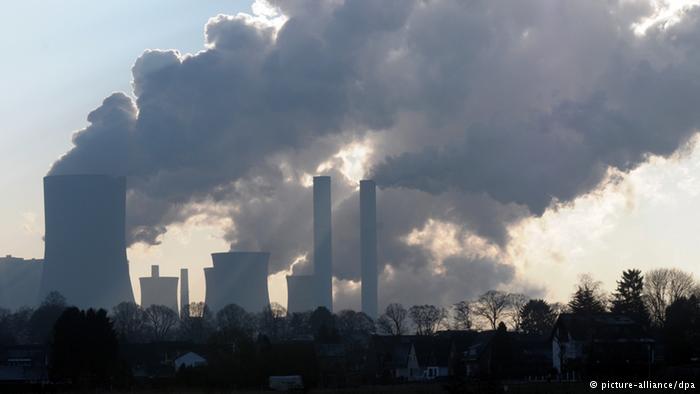They said this is necessary to reduce the amount of climate catastrophes and to protect human lives, especially those of future generations. Part of the Paris Agreement is the swift reduction of CO2 emissions and the quick phase-out of fossil fuels.
For the first time ever, a study by climate research institute Climate Analytics calculated what a cost-effective fossil fuel exit strategy would look like. To fulfill Europe`s climate commitments, the study focused on keeping global warming at 1.5 degrees Celsius until the end of this century.
But as it turns out, achieving this goal won`t be easy. Not only would there need to be zero global CO2 emissions by 2050. Additionally, CO2 would need to be removed from the atmosphere, for example by massive reforestation.
Climate Analytics isn`t alone with these calculations; many other studies also say negative CO2 emissions by 2050 are necessary to fulfill the climate goals.
This underlines how critical the situation really is and how the need to take actions is becoming ever more pressing.

Quick coal phase-out recommended
CO2 is mostly released into the atmosphere when gas, oil, and coal are burned. Energy experts say especially coal-based power generation, which is very harmful to the climate, can be easily and adequately replaced.
"The cheapest way for the EU to reduce emissions is to phase out coal from the electricity sector and replace it with energy efficiency and renewable energy," Paola Yanguas Parra, one of the study`s main authors, said.
However, a new report by Eurostat, the European Union`s central statistics agency, shows that Europe remains worryingly dependent on energy imports from outside the region and has only made very modest progress when it comes to reducing fossil fuels.
In fact, the study shows that fossil fuels accounted for nearly three-quarters of the EU`s energy consumption in 2015, which means fossil fuels are still the main source of energy in Europe by a large margin. According to Eurostat`s report, their proportional weight has decreased over the past three decades as a result of the introduction of renewable energy technologies - but only from 83 percent in 1990 to 73 percent in 2015.
What`s more, Europe`s dependence on imported fossils fuels has increased. 73 percent of fossil fuels consumed in Europe in 2015 were imported, compared to just 53 percent in 1990.
These numbers are in line with the calculations by Climate Analytics, which estimates that the EU`s total budget for coal-based power generation is at 6.5 billion tons of CO2. That`s the maximum amount of CO2 that can be released into the atmosphere if the EU wants to reach its climate goals. Currently, the annual CO2 emissions of coal-fired power plants in the EU is at 0.8 billion tons. If this rate were to continue, the EU`s budget would be completely used up in eight years already.
What does an ideal coal phase-out look like?
So, when, where, and how fast should coal-fired power plants in the EU be switched off in order to reach the climate goals? Climate Analytics`s study "A stress test for coal Europe under the Paris Agreement” tried to answer exactly those questions for each of the 315 power plants currently active in the EU.

Here is what the study recommends: By 2020, 25 percent of all coal-fired power plants currently active in the EU should be shut down and by 2025, 47 percent should be switched off, which means the last three European power plants would be turned off in 2031.
This ambitioned coal phase-out is best accomplished, the researchers say, by implementing an improved trading system for emissions, increasing the amount of renewables and introducing a stable framework for new investments.
The researchers admit that considerable funds would be necessary to master this shifts in the energy sector, but they say the shift would come with considerable economic, social, and ecological benefits.
"The challenge for Europe now is to capitalize on its massive investments in climate policy, to seize the opportunities created by a coal phase out, so that all European regions benefit from this," says Bill Hare of Climate Analytics.
Germany and Poland vital for successful coal phase-out
The two most essential countries for a successful coal phase-out are Germany and Poland. In fact, half of Europe`s coal-fired power plants are located in these two countries, and together they are responsible for more than half of all CO2 emissions in Europe.
According to the study, energy companies in Germany will have to switch off their coal-fired power plants much sooner than planned.
"Our analysis shows that these power plants will need to be shut down long before the end of their economic lifetime in order to stay within the climate goals set at the Paris Agreement," Niklas Roming, one of the report`s authors, said.
The German government is aware of the challenges. It already signed off on the shutdown of five old power plants by 2019. And Germany`s climate action plan 2050, which introduced concrete targets to reduce greenhouse gas emissions, indicates the next steps to be taken. However, the plans for a complete coal phase-out are highly controversial, and so decisions are being postponed until after the federal elections this year.
Contrary to Germany, Poland`s government still intends to rely on coal as the main pillar of its future power supply. "Implementing the Paris Agreement means Poland cannot go ahead with its plans for new coal plants, and instead needs to start introducing a coal phase-out," the study`s Polish co-author Andrzej Ancygier, said.
According to Ancygier, the transition of the Polish energy industry will be a big challenge. But given the fact that costs for wind and solar power have drastically decreased and that "Poland has a great potential for biomass energy," the energy transition is possible.
"The alternatives of renewable energy and energy efficiency will bring vital social and economic benefits," Ancygier said. In his opinion, the EU should help Poland in developing these alternatives.
More about:

































-1741856732.jpg&h=120&w=187&zc=1&q=70')














